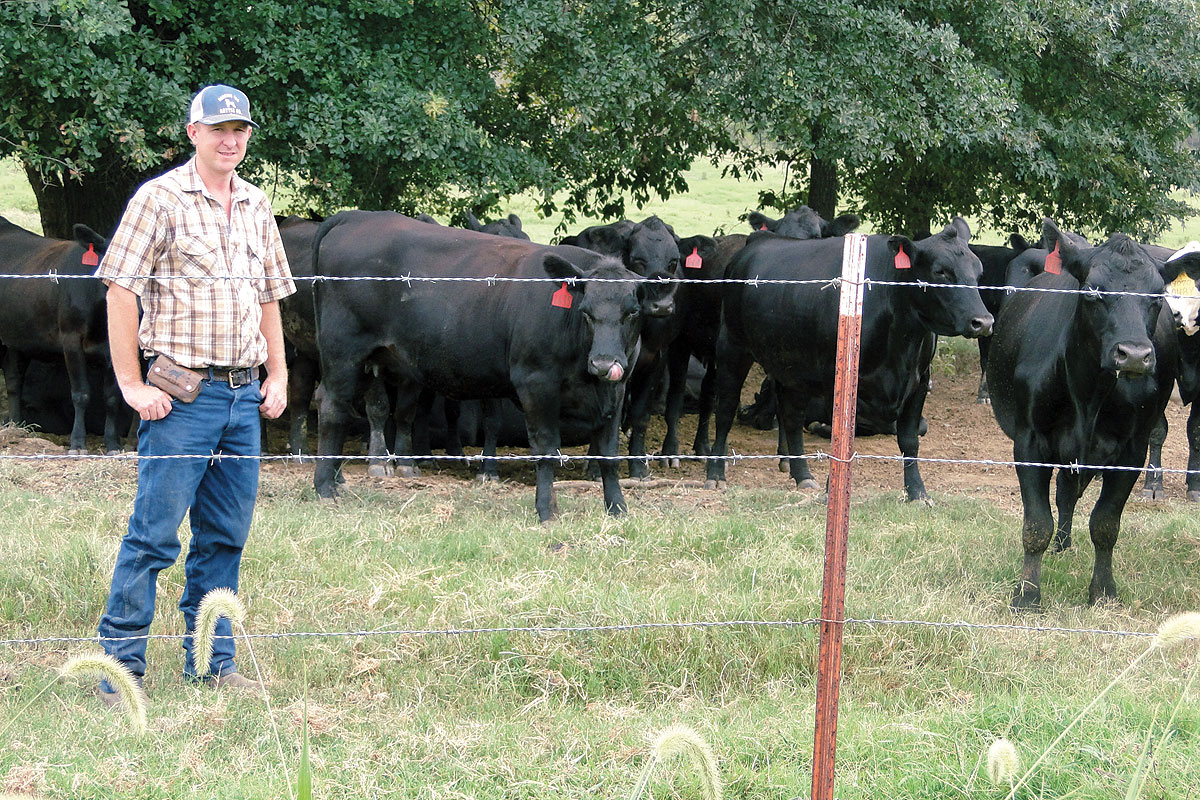
R.C. Rees purchased his first acreage from the estate of his late grandmother
R.C. Rees is a young father whose agricultural life is based upon a firm foundation in the past, a strong work ethic combined with simultaneously seeing both the trees and the forest as he pursues his agricultural career in the present and a patient ambition for the future. Though not a memory, one of the family stories is how R.C. liked to sit on his dad’s chickens while still in diapers, killing them. Needless to say, his father Ricky wasn’t pleased, and R.C. quit quickly. However, R.C. does remember working with his father feeding cattle when he was 3 or 4, and still retains bloodlines from his first cow named Candy Bar who was a Hereford/Angus cross. Learning most of what he knows from his father, R.C. started making money from his own cattle when very young. Then his grandmother passed away when he was 14. Nonetheless, the youngster was able to purchase his first 40 acres from her estate in Bokoshe, Okla., with cattle money and Barking Dog Cattle Company began.
While R.C. didn’t show cattle, he did rope competitively. He met his wife Kayla after returning from a roping competition while in high school. R.C. continued to rope competitively until his son Rich, who is now a year old, was born. He fondly remembers taking his now 4-year-old daughter Gracie to see the cows the day she got home from the hospital. Carrying on the tradition, Ricky started with R.C., Gracie already has her own cow while Rich has a Angus/Simental cow.
The family currently own 155 acres and lease an additional 110 on which they manage 70 momma cows comprised of some registered Angus, some registered Gelbvieh plus crossbreds they have raised. R.C. has purchased Gelbvieh bulls the last five or six years though he now has three Angus bulls.
R.C. AIs most of the herd himself because improving genetics through AI is cheaper than maintaining bulls. He matches each cow to a specific Angus or Gelbvieh bull selecting for calving ease, weaning weight and yearling weight with two goals in mind. One is to produce excellent calves to sell at auction and is to produce breeding quality heifers and bull calves to be sold to local buyers as well as for his own use. One result of his breeding program is that next year all of his cleanup bulls will be ones he raised.
“SimAngus used the Simental bloodline and switched because I wanted to keep hybrid vigor in my herd and felt the Simental influence was too high. I like Gelbvieh because they breed well and weaned calves come in at 600 to 700 pounds,” R.C. explained.
Calves are generally weaned at 9 months and sold 45 days later to give R.C. time to precondition his calves.
Ricky was injured on the farm while hunting and became paralyzed from the waist down. One result is that while their herds are separate, R.C. works with his father every day on his father’s broiler house and cow/calf operation. Cattle are mostly grass fed but supported by a five-way mix from the co-op in Van Buren during the winter.
R.C. and Ricky also share haying by baling some of their pastures and maintaining a mostly Bermuda 140-acre hay field over seeded with rye and containing natural clovers. He and Ricky hay and share 800 to 1,000 bales a year.
“Bahiagrass seems to be spreading and is a fine bladed grass which cattle like to eat, but it’s not good for haying,” explained R.C.
Other land care include soil testing every three years, with R.C. purchasing chicken litter as a fertilizer. In addition, he broadcast sprays for weeds each year with doveweed and horsenettle the most persistent, though he also spot sprays for briars.
As far as the future goes, R.C. wants to have as many cattle and as much land as he can afford. Nonetheless, he understands the value of patience in expanding his operation and waiting for the right time and opportunities.
“I’m not interested in chickens on my place because the startup investment is too high which will get in the way of increasing my herd. Cows are what I love best, and I would like to have a whole bunch.”






